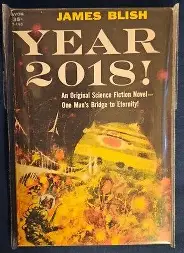in Robert Heinlein's Future History, the interplanetary colonization described in The Green Hills Of Earth;
in James Blish's Cities In Flight, escape of the "Colonials" from the Solar System followed by Soviet domination of Earth;
in Poul Anderson's Psychotechnic History, UN world government and interplanetary colonization;
in Anderson's Technic History, Technic civilization succeeds Western, Soviet etc and English becomes Anglic;
in Jerry Pournelle's CoDominium History, US-USSR CoDominium and interstellar colonization;
in Larry Niven's Known Space History, organ banks, Belt colonization and independence, UN world government, interstellar probes and slowboats.
(I didn't mean to go through all those again but they just came out. All these series told us that we were going somewhere interesting.)
In Blish's history, by 2019, the Western population is uniformly racially mixed. We imagine that this process has become global in the parallel periods of the Technic and Known Space histories.
We find the kind of textual error that we have previously encountered in Anderson's works:

1 comment:
Kaor, Paul!
That bit about the Colonials escaping an Earth soon to be dominated by the monstrous USSR in Blish's CITIES IN FLIGHT reminded me of Anderson's "The High Ones," also about colonists escaping a Soviet conquered Earth.
Ad astra! Sean
Post a Comment